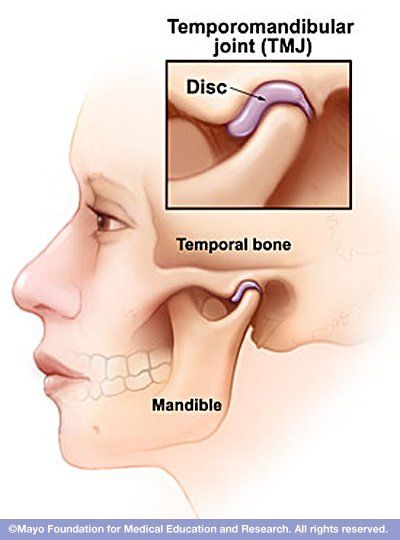TMJ
What is TMJ?
The temporomandibular joint (TMJ) acts like a sliding hinge, connecting your jawbone to your skull. You have one joint on each side of your jaw. TMJ disorders can cause pain in your jaw joint and in the muscles that control jaw movement.
The exact cause of a person's TMJ disorder is often difficult to determine. Your pain may be due to a combination of factors, such as genetics, arthritis or jaw injury.
In most cases, the pain and discomfort associated with TMJ disorders is temporary and can typically be relieved with Therapy.

INFORMATION ABOUT TMJ
Symptoms of TMJ
The main symptom of TMJ Syndrome is pain in the jaw joint. This joint is located just in front of the ear. Pain associated with TMJ Syndrome may involve face, eye, forehead, ear and/or neck pain.
Signs and symptoms of TMJ disorders may include:
- Pain or tenderness of your jaw, especially at the area of the joint
- Popping/clicking of the jaw
- Aching pain in and around your ear
- Sounds of cracking, ringing or popping in the ears
- Pain that feels like a toothache
- Difficulty chewing or pain while chewing
- Aching facial pain
- Headaches, including migraines
- Blurred vision
- Tight, stiff or sore jaw and/or neck muscles
- Muscle spasms in the jaw
- Facial pain, mouth pain, jaw pain, check pain, or chin numbness or tingling
- Pain at the base of the tongue
- Pain, swelling, or a lump in the temple area
- Locking of the joint, making it difficult to open or close your mouth
- Shoulder pain
- Dizziness or vertigo
When to see a doctor
Seek medical attention if you have persistent pain or tenderness in your jaw, or if you can't open or close your jaw completely. Your doctor, your dentist or a TMJ specialist can discuss possible causes and treatments of your problem, and offer you a referral to a service like Champion Rehab.
Causes
The causes of TMJ syndrome are not completely understood. Multiple factors contribute to the muscle tightness and dysfunction that characterize this condition. It is not clear whether some of these causes directly lead to TMJ syndrome or if they are a result of the disorder. Causes may include:
- Misalignment (malocclusion) of or trauma to the teeth or jaw
- Teeth grinding (bruxism)
- Poor posture
- Stress or anxiety
- Arthritis and other Inflammatory Musculoskeletal Disorders
- Orthodontic Braces
- Excessive gum chewing
What is the treatment for TMJ syndrome?
Physical Therapy is a good option for patients that are unable to find relief from home remedies. Most medical treatments will not cure TMJ, but they can provide temporary and immediate relief, and even long-term pain management from the symptoms.
- Massage of jaw and neck muscle performed by Massage Therapist
- Trigger point Dry Needling performed by Physical Therapist (
Click here to learn more about Dry Needling)
- Muscle relaxation techniques
- Physical Therapy with jaw exercises that aims to strengthen muscles, improve flexibility, and range of motion